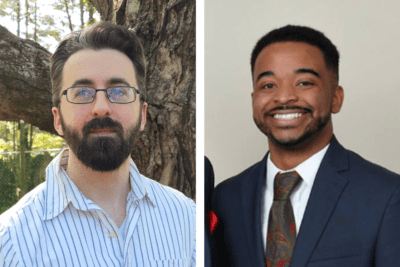SIS Alums Justin Blair and Kay P Maye Complete LEADING Fellows Program for Data Science

In 2022, two School of Information Sciences alumni took part in the LEADING Fellowship Program through Drexel University’s Metadata Research Center. Justin Blair and Kay P Maye were among the 26 fellows to complete a data science project under the mentorship of information science centers across the United States. Maye (’21) is currently the scholarly engagement librarian for social sciences and data at Tulane University, and Blair (’21) continues to focus on publication of his research. We caught up with both to discuss their time in the program and its impacts on their future careers in the field of information sciences.
What was your professional or education background before you entered information sciences?
KPM: I came from teaching. I always wanted to be a teacher my whole life. I got my undergraduate degree from a lovely program and had a wonderful time, but then I got into the field. It was just not aligned with who I was professionally. I think I’ve always been very committed to helping people since I had such inspirational teachers long ago, so I thought teaching was the way to do that.
JB: I actually decided to go back to school in my mid-thirties. I had an associate’s degree but felt I needed to continue my formal education, and I went back to school originally to become a Latin teacher. Though I did well academically, my social anxiety proved to be a real impediment, so I decided a career of speaking in front of people for a living was not the best choice for me.
What brought you to information sciences as well as your current interests within this field?
JB: I was thinking in terms of academic librarianship when I started the SIS program. I wanted to be a subject specialist to draw upon my classics background. The more courses I took, though, the more I was able to explore different interests. I took Dr. Dobreski’s courses on metadata and knowledge organization systems and felt like, this is what speaks to me more than anything else. I found I had a real aptitude for these subjects and that made me want to become a metadata specialist.
KPM: At first, I thought I wanted to be a public librarian, but then I really got into the research element of librarianship. Research was something I was always afraid of, even as an undergraduate. I was like, “Well, how am I smart enough to do this kind of stuff?” But working in information sciences gave me this confidence. I learned that research actually makes sense. It’s just a process, and this helped me learn that I am very systematic in my professional workflows.
Tell us about your particular LEADING Fellows project.
JB: I worked with the Schoenberg Institute for Manuscript Studies (SIMS) at the University of Pennsylvania, using Python to scrape metadata from TEI-XML records for medieval Scandinavian manuscripts in order to contribute them as entries to the Schoenberg Database of Manuscripts. I’m quite proud of that – I went from not knowing how to code at all to actually writing code that works and accomplishes something I wanted it to. That’s a pretty big step.
KPM: I worked with the University of New Mexico’s RAMP (Repository Analytics and Metrics Portal) Program. They collect Google Analytics data from a couple of repositories around the world to help them look at how their items are performing on search engines like the Google Search. So what I am doing is taking the search engine performance data for some of these repositories, and I am clustering to determine which items are performing similarly.
What’s next for you?
JB: The project was a complete success and I was able to contribute over 1,200 new entries to the Schoenberg Database of Manuscripts. I also manually added over two hundred name and place authority records to the database to link with my new entries, which were completed earlier this month. Since then, I’ve been preparing an article about my project entitled “Cultural Heritage of the North: A Contribution of Medieval Scandinavian Manuscript Records to the Schoenberg Database,” which I will soon be submitting for peer-review to the journal Manuscript Studies, so hopefully that will get published sometime later this year.
KPM: One of the things that I’m focused on here at Tulane is how we can create processes and workflows that are reproducible or automatic, so we can free up librarian time for more pressing matters like in depth collection development analysis or in-depth collaboration on instruction. This project really helped me learn how to create these coded workflows to clean data and analyze data, and that will help with our long-term strategic planning.
The first thing I would like to do is to replicate this process at an individual institution level and help libraries think about how their resources are surfacing on search engines. So really taking this content and making it digestible for people, and in an everyday way. I would love to really hone my research skills more, and take this research and maybe apply to other fellowships or other research programs where I can get additional funding to really kick up the metrics and get more data. And hopefully create some predictive models, right? Because I think that a lot of this work that we’re doing in data is really to help people in the future. How can we use what we’ve learned so far to create models that can work for people long term? So that’s what I look forward to next.